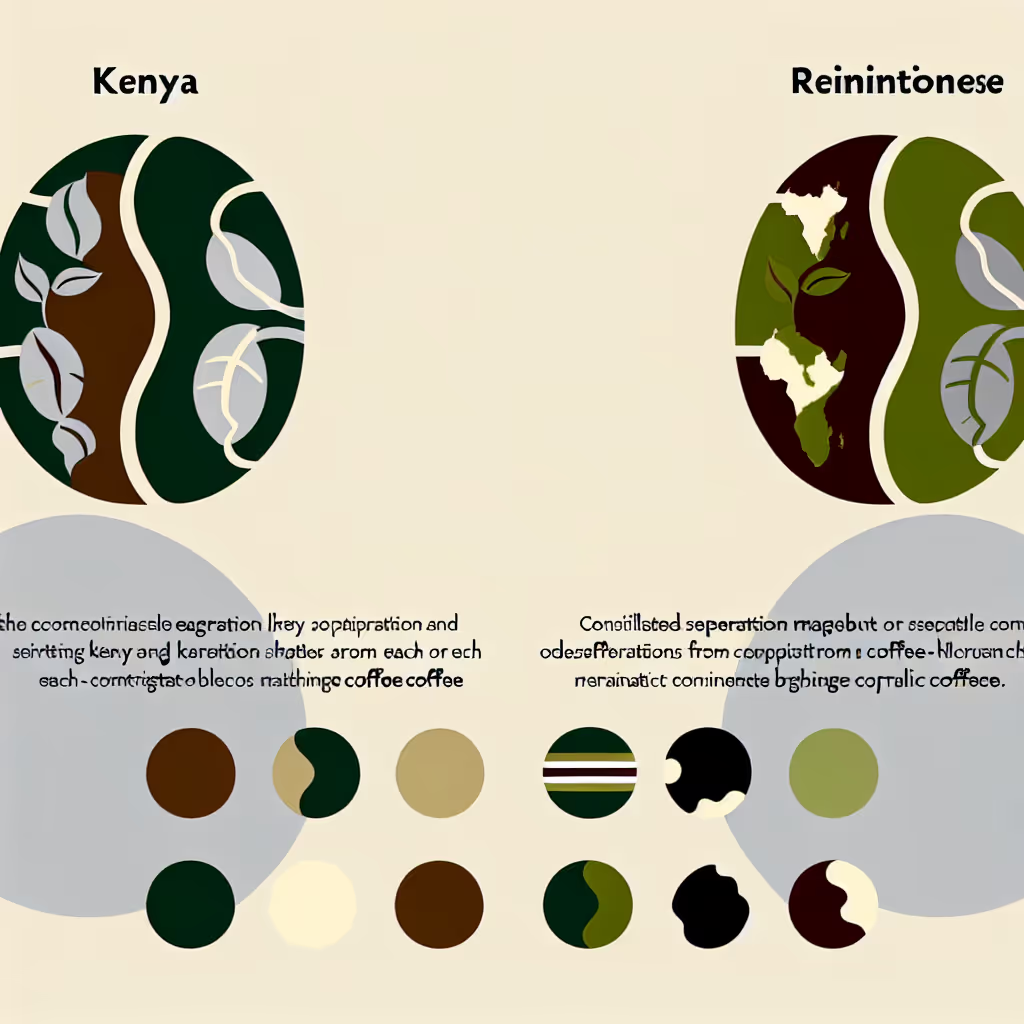Kenyan Vs. Salvadoran Coffee
This comparison explores the distinctive qualities of Kenyan and Salvadoran coffee, highlighting their unique flavor profiles, growing conditions, and processing methods to help coffee enthusiasts make informed choices.

Brief Description
Kenyan coffee is renowned for its bright acidity, full body, and complex flavor profile. Grown in the rich volcanic soils of the Central Highlands, these beans benefit from ideal climate conditions and meticulous processing. The result is a cup that's bold, wine-like, and often described as the 'connoisseur's choice'. With notes ranging from blackcurrant to citrus, Kenyan coffee offers a truly unique and memorable tasting experience.
Salvadoran coffee is renowned for its exceptional quality and distinctive flavor profile. Grown in the volcanic soils of the country's mountainous regions, these beans offer a perfect balance of sweetness and acidity. El Salvador's coffee industry has faced challenges but has rebounded with a focus on specialty coffee production, showcasing unique varieties like the beloved Pacamara. The country's dedication to quality and innovation in processing methods has earned it a respected place in the specialty coffee world.
Importance of Comparison
Comparing Kenyan and Salvadoran coffee is crucial for coffee lovers seeking to expand their palate and understand the nuances of different origins. These two regions offer distinct flavor profiles and represent different coffee-growing traditions, providing insight into how geography, climate, and processing methods influence the final cup. This comparison helps consumers make informed decisions when purchasing specialty coffee.
Key Attributes
Origin
Kenyan
Salvadoran


Consumer Guide
When choosing between Kenyan and Salvadoran coffee, consider your flavor preferences. If you enjoy bright, wine-like acidity with complex fruit notes, Kenyan coffee might be your ideal choice. Look for descriptors like blackcurrant, citrus, and floral notes. For those who prefer a balanced cup with chocolate and caramel notes, Salvadoran coffee could be the perfect match. Consider the brewing method as well; Kenyan coffee shines in pour-over and French press, while Salvadoran excels in espresso. Pay attention to the processing method listed on the package, as this significantly impacts flavor. Washed Kenyan coffees are known for their clarity, while honey-processed Salvadoran beans offer a unique sweetness.
Expert Opinions
Coffee expert Maria Rodriguez notes, 'Kenyan coffee is often described as the 'connoisseur's choice' due to its complex acidity and full body. In contrast, Salvadoran coffee offers a more approachable profile with its balanced sweetness and subtle acidity.' Roaster John Smith adds, 'The Pacamara variety from El Salvador is a game-changer, offering a unique combination of body and flavor that sets it apart from traditional Kenyan offerings.'
FAQs
Kenyan coffee is known for its bright acidity, full body, and complex flavors like blackcurrant and citrus. Salvadoran coffee offers a more balanced profile with notes of chocolate, caramel, and subtle citrus, typically featuring a smoother acidity and medium body.
Kenyan coffee is typically grown at higher altitudes (1400-2100m) in volcanic soils of the Central Highlands, while Salvadoran coffee is cultivated at slightly lower elevations (1200-1800m) in the country's volcanic mountain regions. These differences in altitude and terroir contribute to the distinct flavor profiles of each origin.
For Kenyan coffee, pour-over, French press, and cold brew methods are excellent choices to highlight its complex acidity and full body. Salvadoran coffee performs well with pour-over, espresso, and French press, allowing its balanced flavors and sweetness to shine through.
Kenyan coffee often undergoes washed processing with double fermentation, resulting in clean, bright flavors. Salvadoran coffee utilizes various methods including washed, honey, and natural processing. The honey and natural processes can add complexity and sweetness to Salvadoran beans, while washed processing produces a cleaner cup.
Kenya produces more coffee annually, with approximately 50,000 metric tons compared to El Salvador's 35,000 metric tons. This difference in production volume can affect availability and potentially impact pricing in the specialty coffee market.
While Kenya is known for its SL-28 and SL-34 varieties, El Salvador has gained recognition for its Pacamara variety, a hybrid known for its large bean size and unique flavor profile. The Pacamara variety has become a hallmark of Salvadoran specialty coffee, offering a distinctive tasting experience.
Conclusion
Both Kenyan and Salvadoran coffees offer unique and rewarding experiences for coffee enthusiasts. Kenyan coffee stands out for its bright acidity, full body, and complex fruit notes, making it a favorite among those who appreciate a bold, wine-like cup. Salvadoran coffee, with its balanced sweetness, subtle acidity, and notes of chocolate and caramel, provides a more approachable yet still distinctive profile. The choice between the two ultimately depends on personal preference, brewing method, and the specific flavor journey you're seeking. We recommend trying both origins to fully appreciate the diverse world of specialty coffee and to discover which best suits your palate.






